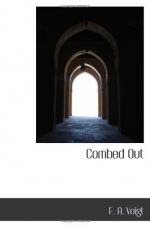The next day, at about the same hour, the dark cloud again rose from the ground and the double explosion followed. We again abandoned the yard and waited in the field. But this time there were several further shell-bursts. No dull boom in the distance followed by a long-drawn whine, but only the earth and smoke thrown darkly up and then the deafening double detonation.
The next day more shells came over, and the next day also.
The big holes with their earthen rims began to dot the fields in many places. No damage of “military importance” had been done. Not even a soldier had been killed, but only an inoffensive cow.
At night the sky was alive with the whirr of propellers, and shells whistled overhead and burst a long way off.
One Sunday, toward the end of March, when we had a half-holiday, I walked up the hill that was crowned by a large monastery and sat down on the slope by a group of sallows. They were in full bloom. A swarm of bees and flies were buzzing round. Peacock and Tortoiseshell butterflies were flitting to and fro. The sunlight filtered down through the bluish haze. I rested and let an hour or two slip by. Then I got up and crossed a little brook and strolled along a narrow path that wound its way through a copse. The ground was starred with wood-anemones, oxlips, violets, cuckoo-flowers, and in damp places with green-golden saxifrage. I came to a small cottage that had pots of flowers in every window. I sat down while a hospitable old woman made coffee and chattered volubly in Flemish. Another soldier arrived soon after. Had I heard the news? The Germans had broken through on the Somme and had captured Bapaume. I asked him if he had seen it in print. No, he had heard it from an A.S.C. driver. He hoped it wasn’t true, but he feared it was.
I returned to camp full of suppressed excitement.
Something was wrong. The shelling of the back-areas continued; air-raids became more and more frequent. These were ominous signs.
Then the newspapers arrived. The Somme front had collapsed. The Fifth Army was in full retreat. The Germans had taken Bapaume and Peronne and were threatening Amiens.
* * * * *
Had I been living in Germany during the war I would have felt a powerful tendency to defend the cause of the Allies, to excuse their misdeeds, to overrate their ability, while being highly critical and censorious of every German shortcoming.
A nation at war is a mob whose very blatancy, injustice and cruelty drive one to hatred and opposition. The enemy mob seems less detestable because it is out of sight and one thinks almost involuntarily: “It cannot be as bad as our own.”
I could not bear to hear a victory joyfully announced. The jubilation and the self-glorification of the crowd filled me with loathing, and I could only think of the intensified slaughter and misery that are the price of every victory. They who pay the price, they alone have the right to rejoice, but they do not rejoice. The German mob revealed its depravity when it hung out flags in the streets to celebrate the first German victories. And, when the first battle of Cambrai was won, London jeered at the bereaved and mocked the dead by ringing the joy-bells.




